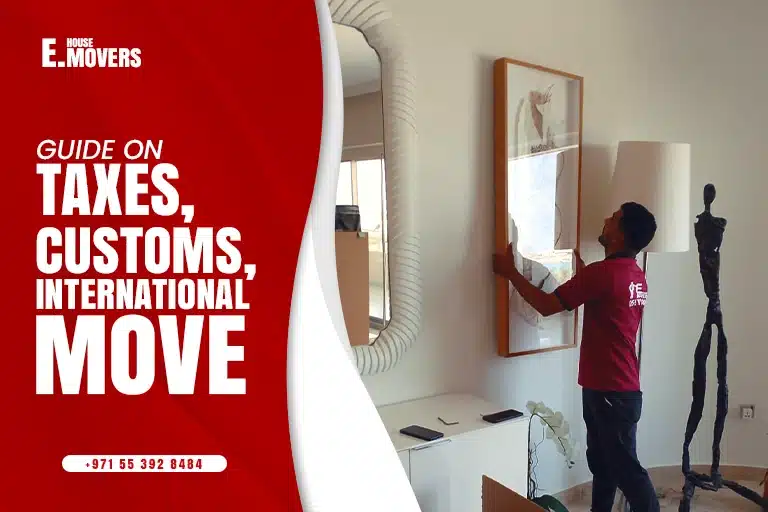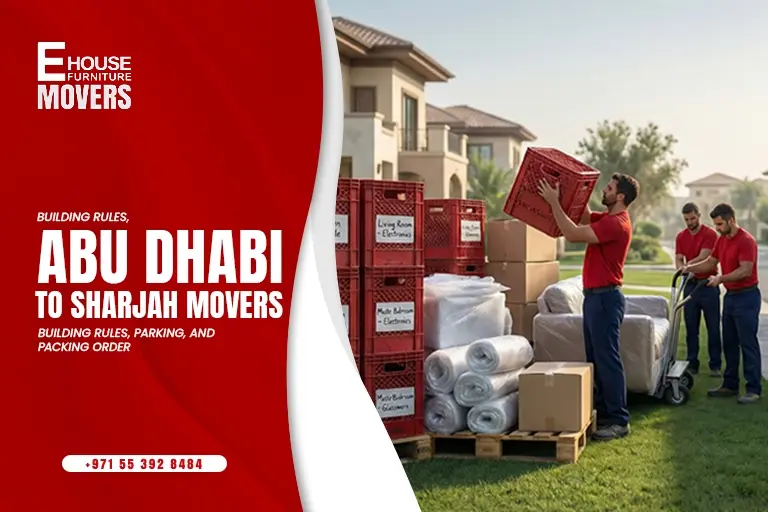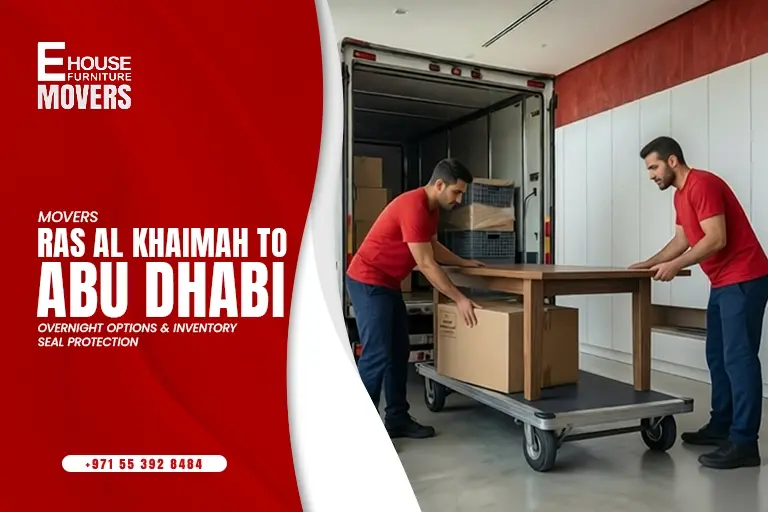Dealing with taxes while shipping goods overseas can be tricky and challenging since there are many factors to consider regarding tax laws. If you or your business is moving abroad, investigate all the laws and taxes beforehand to avoid future issues. Relocating goods from outside countries to the UAE, including Dubai, can require handling tasks like regulatory and tax-related obligations. Recognising the tax rules enables movers and packers to complete tasks perfectly for clients and stay aligned with the guidelines in the UAE.
Understanding Key Tax Terms
First, let’s see what the basic terms in international shipping have to do with taxes:
Customs Duties
Indirect taxes, called customs duties, are levied only on goods that cross the borders. The importer pays these duties as a percentage of the value of the goods. The rates vary depending on the product type and the country of import. For instance, most consumer goods have a customs duty ranging from 5% to 7% of their import value.
Tariffs
Tariffs are direct taxes charged on imported goods. They are usually meant to defend domestic industries from competition from other countries. Unlike customs duties, tariffs are normally added to the price you pay when buying goods. Tariff rates differ based on international trade agreements as well as international geopolitics.
Value-Added Tax (VAT) and Goods and Services Tax (GST)
Value Added Tax (or VAT) is an indirect tax.VAT and GST are consumption taxes applied to selling goods and services. While the United States does not implement a federal VAT, many other countries do. Usually, they consist of a percentage of the cost of the goods, including customs duties and shipping costs. For example, the European Union follows the destination principle in applying VAT to the government of the country where the consumer resides.
Compliance with International Shipping Regulations
It is very important to comply with the international shipping regulations:
- Accurate Documentation: Customs authorities use the shipping labels’ and commercial invoices’ information to determine duties and taxes.
- Understanding Incoterms: International Commercial Terms (Incoterms) identify who pays duty and taxes (such as a seller or buyer) in international transactions.
- Utilising ATA Carnets: ATA Carnets are for use when importing temporarily for trade shows and other professional equipment and materials, where duty and taxes are not imposed for the first year.
Tax Landscape for the UAE Moving Industry
Corporate Taxation: A New Era for Movers and Packers
From 1 June 2023, businesses in the UAE are subject to a federal Corporate Tax on their profits. The new tax reform was meant to support small and medium businesses by charging a 9% starting statutory tax rate on profits above AED 375,000.
Taxable profit up to 375,000 dirhams is taxed at a rate of 0%.
Taxable profit exceeding 375,000 dirhams is taxed at a rate of 9%.
Small Business Relief
Persons with revenue for the tax period up to 3 million dirhams may opt for the Small Business Relief tax regime and pay no corporate tax. The right to apply SBR is lost if the threshold amount is exceeded. The program is valid until December 31, 2026.
Corporate Tax Exemptions in the UAE
The Federal UAE CT Law covers all of the Emirates and also all business and commercial activities, with the exception of those persons and businesses specified (subject to particular conditions):
- UAE government entity.
- UAE government-controlled entity.
- Person engaged in an extractive business in the UAE.
- Person engaged in a non-extractive natural resource business in the UAE.
- Qualifying public benefit entity.
- Qualifying investment fund.
- A juridical person incorporated in the state, wholly owned and controlled by certain exempt persons.
- Any other person as may be determined in a decision issued by the Cabinet at the suggestion of the Minister.
Domestic Minimum Top-Up Tax (DMTT): Implications for Large Enterprises
Under Federal Decree Law No. 60 of 2023, the UAE issued Cabinet Decision No. 142 of 2024 on the Imposition of Top-up Tax on Multinational Enterprises in respect of Domestic Minimum Top-up Tax in the UAE (the “UAE DMTT”). The UAE DMTT is in use for financial years that begin on or after January 2025. The UAE DMTT will apply to Constituent Entities that are members of Multinational Enterprises (“MNEs”) operating in the UAE with annual global revenues of €750 million or more in the Consolidated Financial Statements of the Ultimate Parent Entity in at least two out of the four financial years immediately preceding the financial year in which the UAE DMTT applies.
Why Is the UAE Implementing This?
Many firms find the UAE attractive for their regional headquarters due to its low tax rate. As more countries encourage fairness and transparency in taxes, the UAE also adopts global standards.
- Maintain the country’s image with international investors.
- Avoid the risk of other countries imposing their top-up taxes on UAE-based profits.
- Support the economy to not depend on oil income only for its development.
UAE Customs Duties: What Movers Must Know
Standard Customs Duty Rates
For most goods, the UAE sets a customs duty rate of 5% of their Cost, Insurance, and Freight (CIF) value.
- Alcohol: 50%
- Cigarettes and Tobacco Products: 100%
They are applied the same way in all emirates, including Dubai. Movers and packers need to estimate duties to help their clients understand the possible costs.
Duty Exemptions and Free Trade Zones
Concerned about investors’ opinions, the UAE’s government created a complicated system for foreign traders to continue accessing the well-known Free Trade Zones (FTZs), with no import duty. The UAE offers investors more than 40 multidisciplinary free zones in which expatriates and foreign investors can fully own companies. Such zones feature innovative infrastructure and extra services that allow smooth work operations and more business productivity.
Benefits of Setting Up a Business in a UAE Free Zone
- 100% Foreign Ownership
- 100% Repatriation of Profits
- Fast and Easy Business Set-up Procedures
- Developed Business Communities
- Opportunities at Competitive Costs
- 100% Exemption from Corporate and Income Taxes
- 100% Exemption from Customs Duty
- Independent Laws and Regulations
- Easy Regional, Global Market Access
- World-Class Infrastructure
Value-Added Tax (VAT) in the UAE
Nearly all goods and services have a general VAT rate of 5%. Goods and services for which there is a 0% rate or that enjoy exemption from VAT, subject to certain conditions being fulfilled, are exempt from VAT. Further, according to Cabinet Decision No. 46 of 2020, a person shall be considered ‘outside the state’ and thus fall under zero-rating export of services if they have a short-term presence in the state of less than a month and the presence is not effectively connected with the supply.
For UAE resident businesses, the mandatory VAT registration threshold is AED 375,000, and the voluntary registration threshold is AED 187,500. Clients should be informed by movers about these exemptions and about preparing the requisite documents for the exemption.
Navigating VAT Regulations
VAT on Imported Goods
- International Transportation Services: These are usually zero-rated and taxable, but at a 0% rate. However, they only relate to services whose transportation begins or concludes outside the UAE.
- Domestic Transportation Services: Services conducted in the UAE are subject to the standard 5% VAT.
Movers need to know what services to charge and what VAT rate to apply so that the charges comply with actual charges.
Primary Documents in Import Delivery Records: Ensuring Smooth Customs Clearance
Good documentation will make customs clearance quite smooth. Below are the crucial documents every importer should keep on record:
- Bill of Lading (BOL)
- Commercial Invoice
- Packing List
- Import Customs Declaration
- Certificate of Origin
These papers have to be prepared by clients, but movers should help make them accurate and complete. Passengers travelling out of or entering the UAE with more than AED 60,000 in cash or an amount equivalent to this in other currencies, financial instruments, precious metals, or valuable stones must declare it to the Federal Authority for Identity, Citizenship, Customs & Ports Security (ICP).
Personal belongings are permitted entry and shall be exempt from customs fees if the passenger meets the following conditions:
- Gifts, perfumes, and personal luggage are not valued above AED 3,000.
- Your luggage and what you take as gifts must be minimal and in a non-commercial quantity.
- The passenger should not be a frequent traveller with goods regularly, or a member of the respective conveyance crew.
Talk to the authorities in UAE customs or a licensed customs broker to be sure everything goes smoothly.
Special Considerations for the Movers and Packers Industry
Restricted and Prohibited Items
The UAE does not accept the import of all items.
- Controlled Medications: Special documentation is needed for this, and prior approval is required.
- Items Contradicting Islamic Values: This can include such as particular publications or artworks.
- Weapons and Ammunition: Unless special permits are granted, it is totally forbidden.
Movers in Dubai must inform clients about such requirements so they are free from legal trouble.
Financial Impact on the Moving Industry
- Operational Costs
- Compliance Expenses: The requirement for enhanced accounting and compliance systems, due to corporate tax, has the effect of raising operational costs.
- Cash Flow Management: For businesses that choose to implement DMTT for qualifying MNEs, management of cash flows will have to fit in with tax liabilities.
- Pricing Strategies
- Operational Costs: To comply with new tax regulations, moving companies have had to invest more of these costs into accounting and legal services.
- Pricing Strategies: Tax liabilities may require companies to shift their pricing, yet remain competitive.
- Client Communication: It’s important to communicate with transparency around pricing changes as a result of tax implications, to continue to build client trust.
Tax Implications of International Moves
Historical Context: Evolution of Tax Policies Affecting International Moves
- Pre-2018: The UAE had a reputation as a tax-free country, and it brought expatriates and businesses.
- 2018: A huge shift was initiated by the introduction of a 5% Value Added Tax (VAT) on a number of sectors, including logistics and moving services.
- 2023: The UAE’s tax changes, by making the corporate tax rate 9% for earnings above AED 375,000, came closer to what many other countries do.
- 2025: A 15% Domestic Minimum Top-Up Tax (DMTT), introduced for multinational enterprises (MNEs) earning more than €750 million globally, following the OECD’s Pillar Two rules.
Current Tax Landscape for International Moving Services
- VAT on Moving Services: VAT at the standard rate of 5% applies to the provision of domestic moving services, whereas international transportation services are, in principle, zero-rated, subject to certain conditions being met.
- Corporate Tax: Companies engaged in international moving services with taxable profits above AED 375,000 are subject to the 9% corporate tax.
- Free Zone Considerations: Entities that operate in free zones are exempt from tax if the applicable conditions are met. However, income from mainland transactions may be subject to corporate tax.
Tax Forecast & Future Outlook for Dubai’s Movers and Packers Industry
Economic Diversification
The UAE has moved to diversify its economy away from oil revenues, and the logistics and moving industry is contributing greatly to that transition.
Market Growth
Infrastructural investment and technological advances will steer the UAE logistics market to a CAGR of 5.7% through 2033. International relocation services are fuelled by the UAE’s economically privileged strategic position and increasing expatriate population.
Digital Transformation
Digital technologies adaptation in line with tax laws, customer relationship management and increasing operational efficiency.
Sustainability Initiatives
Potential incentives for businesses to adopt green logistics practices are becoming an increasing environmental consideration.
Increasing Regulatory Scrutiny
- With the new tax laws being implemented (corporate tax and VAT compliance) by the UAE, moving companies need to invest in better frameworks of compliance.
- Everything, from customs and tax systems to trade data, is expected to speed up digitalisation, increasing transparency but demanding tech adoption.
Recommendations for Industry Stakeholders
- Enhance Compliance Frameworks: Improve your accounting and tax handling to suit the latest government rules.
- Strategic Financial Planning: Including taxes in your financial planning will keep your business running and profitable.
- Client Engagement: Always talk with clients about changes in costs and tax issues.
- Invest in Technology: Make use of technology to reduce workload, improve service for customers and maintain compliance.
- Explore Sustainability Programs: Make sure your business is eco-friendly to match what the government and market expect.
- Invest in Technology: Take advantage of technology so that daily work is simplified, service is enhanced, and all rules are obeyed.
A proactive response to the changing tax environment poses a perfect opportunity for growth and consolidation for moving and logistics companies in the UAE. Further understanding the evolving tax landscape and more proactive adaptation of strategies are the best ways to move logistics companies covering the UAE and Dubai in reaching the international moving sector so as to be able to cope with emerging challenges and capitalise on emerging opportunities.
Key Considerations Before Shipping Goods Abroad
Accurate Customs Documentation
Insufficient or inaccurate documentation can lead to being penalised with fines or things being confiscated, or even delayed. Make sure your movers are professionally working with the customs paperwork and that all of the invoices, packing lists, and customs descriptions are correct.
Understanding Restricted and Prohibited Items
Each country has restrictions as to what can be imported. So familiarise yourself with these to avoid complications.
Insurance and Liability
With international moves there is always the risk of loss or damage. See that your insurance allows for costs connected to holding your goods at customs or the duties for your shipment.
Practical Tips for Movers, Packers, and Clients in Dubai
- Plan Early: Start tax and customs research before moving. Check what the UAE needs for exports and what import tax applies to your goods in the country you are selling to.
- Work with Licensed Movers: Hire movers who know all about the VAT rules, UAE laws, and international tax laws.
- Keep Records: VAT zero rating must be instructed, documented in detail, and customs clearance organised.
- Consult Tax Experts: In certain situations, it pays to ask for professional guidance if you are moving corporate relocations or important goods.
Strategic Recommendations for Movers and Packers
- Risk Management: Figure out ways to eliminate financial and regulatory risk with regard to cross-border moves.
- Customer Education: Increased transparency and increased trust will be achieved if the clients are educated on the tax implications.
- Technological Integration: Start to use digital platforms to automate the execution of the compliance and documentation process.
- Sustainability Initiatives: Standard operations on an eco-friendly approach with Dubai’s sustainable goals.
Strategies to Mitigate Tax Liabilities
There are also ways to minimise tax when shipping goods internationally.
- Research Destination Country Regulations
In each country, there are import duties, taxes or exemptions. Customs liability for charges applicable at the destination country can be verified by consulting the customs authority of this country.
- Consider Free Trade Agreements (FTAs)
There are FTAs between countries that get rid of some or reduce duties and tariffs on goods of a certain kind. For instance, the U.S. may have a FTA with another country, say, Australia and Canada, and so forth, in which such countries will give some goods preferential treatment.
- Engage with Customs Brokers
Professional movers like E-House Movers know their way through the toughest international shipping regulations and will help you make sure your company is compliant and minimising its tax obligations.
Conclusion: A Well-Planned Move Begins with Tax Clarity
Moving internationally, and particularly in and out of the UAE, requires more than logistics expertise. One should know what taxes and customs regulations and laws apply to their import and export process, from the country of shipping to the arrival country. Whether you’re an individual relocating your home or a business expanding operations, tax planning should be an essential part of your moving checklist. Learning about all VAT rules and general free zone policies can help you avoid costs and difficulties in moving.
When movers help guide you through documentation and customs, your move goes more smoothly and your finances are better protected.
Frequently Asked Questions (FAQs)
What taxes and duties should I know when shipping goods to the UAE?
Are personal belongings exempt from customs duties when moving to the UAE?
How does VAT apply to moving and relocation services in the UAE?
VAT is generally not charged on international transportation services, and these are zero-rated, but proper documentation needs to be maintained when receiving zero rating on services.
Domestic moving services in the UAE are subject to the standard 5% VAT.
What documents are required for customs clearance when importing goods into the UAE?
– Commercial Invoice
– Packing List
– Certificate of Origin
– Import Permit
– Proof of identity or business registration
– Delays or fines result if documentation is not accurate and complete.
Are any items prohibited or restricted for import into the UAE?
– Controlled medications
– Weapons and ammunition
– Items contradicting Islamic values (like specific publications or media)
To be sure you have an updated list, always check with your moving company or UAE customs before shipping.
What is the current corporate tax rate in the UAE, and does it affect moving companies?
What is the Domestic Minimum Top-Up Tax (DMTT), and to whom does it apply?
How can businesses and individuals reduce tax liabilities on international moves?
– Check what destination country regulations and duties you need to see.
– Free trade zones are to be considered for duty exemptions.
– Free Trade Agreements (FTAs) Prefer.
– Always use licensed customs brokers and skilled movers such as E House Movers.
– Be sure to document well and completely.
Why is it essential to work with licensed international movers in the UAE?
What practical tips should I follow before moving goods internationally from the UAE?
– Work with experienced, licensed movers
– Maintain organised, accurate records
– Consult tax experts
– Review insurance policies




